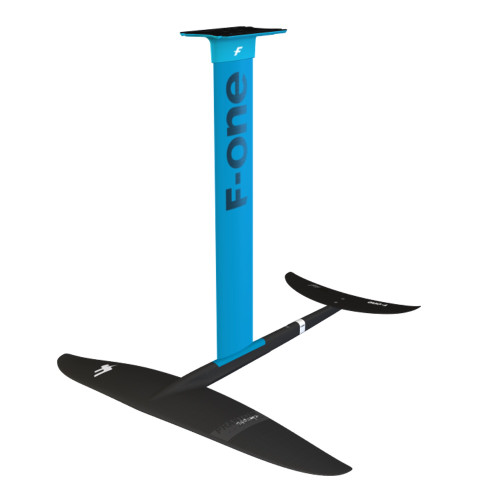F-One Foil Mast Assembly
The F-One Foil Mast Assembly is an Aluminum Mast with the Titan Mast foot and the Mast Top Plate. The Mast Assembly includes all of the necessary parts to complete a F-one Carbon Gravity or Phantom Foil for use on a board with a twin track mounting system and all F-One boards with a 4 bolt mounting system.
LENGTHS: 45, 55, 65, 75, 85, 95
This Mast Assembly Includes:
- F-One Aluminum Mast
- All hardware to assemble and the screws and T-nuts to mount it to a board
- Titan Mast Foot
- Mast Base plate
How to choose your F-One Foil
At F-ONE, there is no compromise on quality no matter the product. Our 2022 foil range is our most comprehensive, modular, and accessible one to date.
Here is our guide to help you choose your F-ONE foil. Keep in mind that your setup will vary depending on your skill level, your weight, the conditions, and your chosen program.
ASPECT RATIO
The Aspect Ratio (AR) is key to understanding how we constructed our range of foils, and it should be your first guide in choosing a front wing.
The AR is the ratio between surface area and wingspan.
Overall, foils with a low- to mid- AR will be a bit thicker and rounder. They are more stable, turn and pivot well, have plenty of lift, and will help you take-off easily at low speeds or in low wind conditions. Those with a high AR will be thinner and longer, and thus produce less induced drag. They are highly efficient and will provide a lot of glide and speed.
The higher the AR, the better the foil performs for experienced riders and the further it flies. However, it also requires more minimum speed to start planing and develop lift. The AR also influences the turning radius of each foil. With equal areas, a higher AR makes wider turns. Finally, there is also a link between the swell period and the AR of the foil. The longer the swell period, the more AR you need.
RANGE PRESENTATION & PROGRAMS
For this new collection, we based everything on aspect ratio. As we started designing and trying out high aspect ratio foils, we discovered they opened new programs and new possibilities.
We have classified our range in four levels of AR to define a program for each foil:
An AR of 5.0 is the most accessible and is recommended to learn how to foil.
The most versatile and best performing is the AR 6.0. Its medium span guarantees maneuverability for surfing and accessible pumping.
When you switch to an AR of 7.0, you increase your maximum speed and will glide further, but the extra span penalizes the maneuverability.
The AR of 9.0 and above is reserved for experienced riders. It offers incredible glide if you maintain sufficient speed and brings good maneuverability under 1000cm².
HYDROFOILS OVERVIEW
Front Wings
For kite foiling, we have three models. The ESCAPE (AR 6.0) is aimed at high-performance kiting and speed, but can also be used by experienced riders to surf big waves. The MIRAGE (AR 4.5) is a versatile foil, great for freeriding and carving. The IC6 950 V.3 rounds up the range with its 4.4 AR and is intuitive, predictable, and very user-friendly.
Our range of foils for wing and surf foiling has considerably expanded this year.
It starts with the GRAVITY and its AR of 5.0. It is the foil you should have if you want to learn how to use both a wing and a foil. Accessible and straightforward, the GRAVITY foils have great lift and stability.
If you already have some experience with a foil and are looking for more performance and glide, the versatile and must-have PHANTOM foil (AR 6.0) is for you. It is a fantastic foil that does everything well. Its medium span guarantees performance, maneuverability for surfing and efficient pumping. Everybody should have a PHANTOM foil in their quiver.
As you continue improving and want to change up your ride, a foil with a high AR will bring more speed, great carving capabilities, and more acceleration. The new PHANTOM S, with an AR of 6.5 and surface areas below 1000cm², have a thinner profile than the regular PHANTOM to give you more speed and maneuverability. If you’re a surfer, then the handling, maneuverability, and carving abilities of this foil are made for you. Both PHANTOM and PHANTOM-S are also perfect for freestyle wing sessions.
If you want more glide, even more speed, and fantastic upwind potential, then the SEVEN SEAS is for you. Moving into open seas, its AR of 7.5 makes it great for surfing the swell and downwinding on small chops or in light winds. Its optimized design for minimal drag will also reduce the traction in your arms as you travel upwind with a wing.
Finally, the EAGLE and its AR of 9.5 will let you fly incredibly far and fast. Its thin profile leads to minimal drag, and brings an unmatched and seemingly endless glide.
Whether in freefly or downwind, you will be able to go much faster, further, and longer. Its stability and impressive control will let you fully focus on the entire experience.
The EAGLE will transform your session once you have the level to ride it as fast as it needs to enjoy its full potential. This foil is a completely new way of using the sea and the swell. Every chop is becoming more powerful; everything brings more sensation.
Stabilizers
The stabilizer is just as important in your foil setup as the front wing, and we truly believe the future lies in its development and innovation.
The stab undoubtedly influences the behavior of the entire foil. Simply changing it while keeping the same front wing can boost your ride and bring about completely different sensations and performances, as if you were on an entirely different setup.
For example, beginner wing foilers will want to look at the C275 or R275 stabs (AR 5.3), which will be a bit slower but more stable, before moving on to the C250 range and its 6.1 AR. Then, with its 8.8 AR and incredibly thin profile, the DW210 is truly made for speed and downwind.
Some of our stabs also have generous winglets, like the IC6 300 for kite foiling, which offers even more stability on the yaw axis and fantastic control.
A rider shouldn’t be afraid to switch out and try out different stabs to gain performance, speed, glide, turn radius or stability, depending on the conditions or chosen program. Obviously, the choice of stab needs to stay coherent with the rider’s level and intentions, as not all will match with all front wings.
Fuselages
Just like a bigger or smaller stab will influence your ride, so will a shorter or longer fuselage.
Changing the size of your fuselage will help as you go from one front wing to the next. For example, you will lose a bit in maneuverability going from a PHANTOM to a SEVEN SEAS. However, you can gain some of it back by simply picking a shorter fuselage like our Carbon Fuselage XXXS.
Finally, the length of your fuselage influences the pace of pumping as well. A shorter fuselage will require a bit more effort and a faster pace in pumping to get up and start flying.
Masts
The mast connects the plane (front wing, fuselage, stab) to the board.
It will also be easier to learn wing foiling or kite foiling on a shorter mast. The falls will be gentler, and you will feel more stable as you learn to get up and stay up. A shorter mast is also ideal for sessions in shallow waters.
A long mast offers more leverage and is good for choppy conditions. With a higher mast, you have more room to angle the foil and make aggressive turns in the waves without the foil breaching.
CONSTRUCTION & TECHNOLOGIES
We offer three types of constructions on our foils: Carbon (pre-preg and High Modulus), FCT, and Injected Carbon.
All our carbon hydrofoils are made from pre-preg, which makes them incredibly strong and stiff. Some of our foils, like the EAGLE or the ESCAPE, have an added layup of High Modulus Carbon fiber that leads to even more rigidity in both bending and torsion while keeping enough comfort for any kind of practice.
Our GRAVITY and PHANTOM foils are available in both carbon and FCT (Foil Compression Technology). FCT foils are built in fiberglass around a high-density foam core. The wing is then covered by a thin and strong shield skin. This F-ONE innovation offers impressive mechanical properties, making it particularly suited for foils subjected to high stresses and bending loads.
As you are riding, the difference between a carbon and FCT foil is barely noticeable. Both have the same shape and program. FCT foils do have a bit more flex, but the performance potential on the water is very much the same.
The IC6 950 V.3 is built with the Injected Carbon Technology, consisting of an injected polymer reinforced with carbon fibers. This technology makes these foils a lot more resistant and durable.




 AVAILABLE FOR PICKUP AND DELIVERY
AVAILABLE FOR PICKUP AND DELIVERY